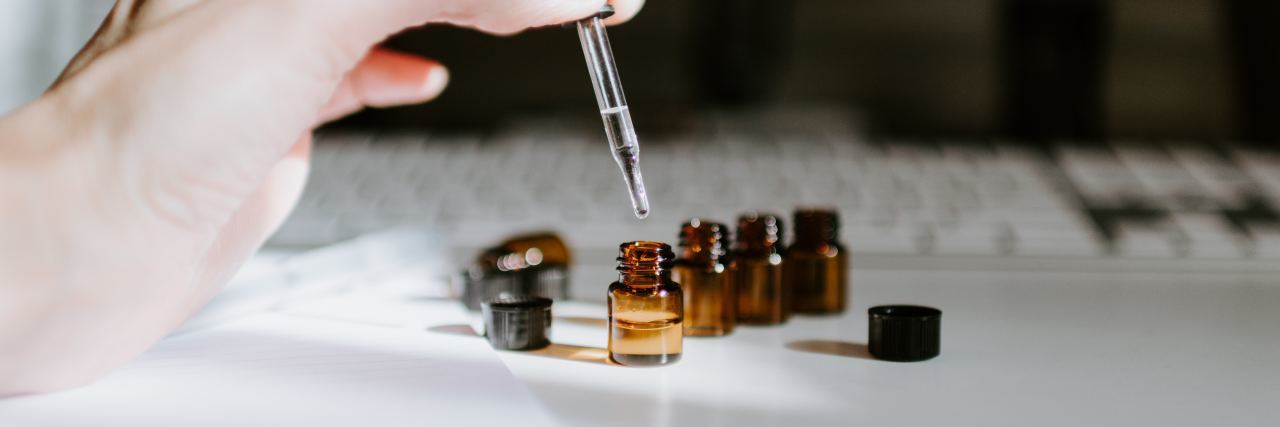What Happened When I Tried CBD Oil for My Bipolar Disorder
Editor's Note
Please see a doctor before starting or stopping a medication.
CBD has been touted as a natural alternative used to treat anxiety, depression, insomnia and nausea, and there is plenty of anecdotal evidence showing that it does help with those health concerns and many others. Unfortunately, the scientific studies are few and far between because marijuana has been an illegal drug, and remains so in many jurisdictions. This makes it harder for researchers to conduct studies on the drug. Still, the stories of so many who have been helped by both marijuana, or its derivative CBD, are compelling. So, when Canada fully legalized recreational marijuana and set up strict testing policies, quality control measures and rules about labeling, I decided it was time to see what all the fuss was about.
• What is Bipolar disorder?
I mean, as someone who has had bipolar disorder for over two decades, I could do with a little less anxiety and a bit more sleep. And while I do have medications I can take when my anxiety or insomnia get really bad, they both have a long list of side effects that I would like to avoid, if I can. That led to a strange conversation with my primary care physician.
“So, I was wondering what your thoughts are on CBD oil,” I asked her hesitantly.
To my surprise, she was very receptive and immediately sent a referral to a medical marijuana clinic. In under a week, I met with a consultant who explained the ins and outs of the law governing both marijuana and CBD, how to figure out the correct dose of CBD, when to take it and where to buy it. I also spoke briefly with a doctor who specializes in medical marijuana, who had reviewed my medical history and current medications, and he recommended a specific product type to start with — strictly CBD, no THC in the oil at all.
All the people I spoke with at the clinic were very encouraging. They too had seen many people benefit from medical marijuana and were confident it would help me in some way.
A few days later, when the mail carrier knocked on my door and asked for my signature, he must have sensed my excitement. “I assume you know what’s in here?” he asked. “Yep,” I replied, “it’s my marijuana!” He shook his head as he gave me the box, which is when I realized it came in an unmarked box and the mail carrier was likely asking a rhetorical question.
I started taking a very small dose of CBD oil that night. And the following morning. And the following evening. Slowly titrating up the dose, as I had been instructed. I knew I wouldn’t feel the effects right away. So, I wasn’t concerned when I didn’t feel at all different after a couple of weeks. That meant I just need to keep upping the dose. I was still confident that I would be one of the people raving about the compound, extolling its virtues to anyone who even mentioned insomnia or anxiety in passing.
If having a positive attitude about a treatment impacts its effectiveness — the “placebo effect” — I had positivity in spades. After a month using CBD oil and seeing no impact on my sleep or anxiety, I started to get discouraged. After six weeks, I was frustrated that things still hadn’t changed for the better. After more than two months of taking the CBD oil religiously, twice a day, as prescribed, I didn’t feel even a bit different.
My anxiety was still firmly living in its little hole in my brain, and insomnia was still making visits to me at night on occasion. It felt like I failed at medical marijuana. I did everything little thing right and it did help. I had to admit that it wouldn’t be my miracle cure.
Looking back, I should have tempered my enthusiasm and expectations. I have been on and off 21 different psychotropic medications over the last 20 years. I am on a stable set of medications now, each different medication targeting a different symptom, that allow me to lead a “normal” life. And while they do their job, none of them have been a miracle cure. I still feel the effect of bipolar disorder every day, in varying degrees. The side effects of these medications can be terrible, and some have severely impacted my physical health. So, I should have reminded myself going into this short CBD oil experiment that there is no such thing as a miracle cure.
Despite this experience, I will continue to do my best to understand emerging science about the treatment of mental illness and push policy makers to put more emphasis and funding into research about the treatment of mental illness. There is no drug or diet or therapy or physical treatment that can cure bipolar disorder. At least not yet. I choose to still believe that a miracle can happen.
Photo by Kelly Sikkema on Unsplash

